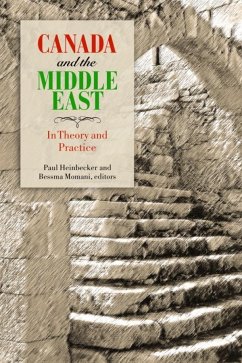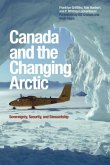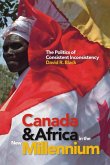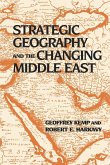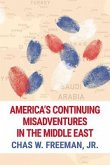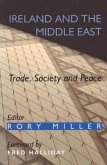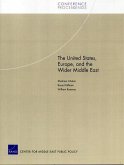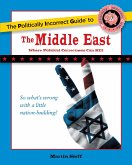Canada and the Middle East
In Theory and Practice
Herausgeber: Heinbecker, Paul; Momani, Bessma
Canada and the Middle East
In Theory and Practice
Herausgeber: Heinbecker, Paul; Momani, Bessma
- Broschiertes Buch
- Merkliste
- Auf die Merkliste
- Bewerten Bewerten
- Teilen
- Produkt teilen
- Produkterinnerung
- Produkterinnerung
Canada and the Middle East: In Theory and Practice provides a unique perspective on one of the world's most geopolitically important regions. From the perspective of Canada's diplomats, academics, and former policy practitioners involved in the region, the book offers an overview of Canada's relationship with the Middle East and the challenges Canada faces there. The contributors examine Canada's efforts to promote its interests and values-peace building, peacekeeping, multiculturalism, and multilateralism, for example-and investigate the views of interested communities on Canada's relations…mehr
Andere Kunden interessierten sich auch für
![Canada and the Changing Arctic Canada and the Changing Arctic]() Franklyn GriffithsCanada and the Changing Arctic36,99 €
Franklyn GriffithsCanada and the Changing Arctic36,99 €![Canada and Africa in the New Millennium Canada and Africa in the New Millennium]() David R BlackCanada and Africa in the New Millennium49,99 €
David R BlackCanada and Africa in the New Millennium49,99 €![Strategic Geography and the Changing Middle East Strategic Geography and the Changing Middle East]() Geoffrey KempStrategic Geography and the Changing Middle East25,99 €
Geoffrey KempStrategic Geography and the Changing Middle East25,99 €![America's Continuing Misadventures in the Middle East America's Continuing Misadventures in the Middle East]() Chas W Freeman JrAmerica's Continuing Misadventures in the Middle East15,99 €
Chas W Freeman JrAmerica's Continuing Misadventures in the Middle East15,99 €![Ireland and the Middle East Ireland and the Middle East]() Fred HallidayIreland and the Middle East32,99 €
Fred HallidayIreland and the Middle East32,99 €![The United States, Europe, and the Wider Middle East The United States, Europe, and the Wider Middle East]() Shahram ChubinThe United States, Europe, and the Wider Middle East12,99 €
Shahram ChubinThe United States, Europe, and the Wider Middle East12,99 €![The Politically Incorrect Guide to the Middle East The Politically Incorrect Guide to the Middle East]() Martin SieffThe Politically Incorrect Guide to the Middle East17,99 €
Martin SieffThe Politically Incorrect Guide to the Middle East17,99 €-
-
-
Canada and the Middle East: In Theory and Practice provides a unique perspective on one of the world's most geopolitically important regions. From the perspective of Canada's diplomats, academics, and former policy practitioners involved in the region, the book offers an overview of Canada's relationship with the Middle East and the challenges Canada faces there. The contributors examine Canada's efforts to promote its interests and values-peace building, peacekeeping, multiculturalism, and multilateralism, for example-and investigate the views of interested communities on Canada's relations with countries of the Middle East. Canada and the Middle East will be useful to academics and students studying the Middle East, Canadian foreign policy, and international relations. It will also serve as a primer for Canadian companies investing in the Middle East and a helpful reference for Canada's foreign service and journalists stationed abroad by providing a background to Canadas interestsand role in the region. Co-published with the Centre for International Governance Innovation
Produktdetails
- Produktdetails
- Verlag: Wilfrid Laurier University Press
- Seitenzahl: 246
- Erscheinungstermin: 26. Oktober 2007
- Englisch
- Abmessung: 231mm x 152mm x 18mm
- Gewicht: 363g
- ISBN-13: 9781554580248
- ISBN-10: 1554580242
- Artikelnr.: 26269710
- Herstellerkennzeichnung
- Libri GmbH
- Europaallee 1
- 36244 Bad Hersfeld
- gpsr@libri.de
- Verlag: Wilfrid Laurier University Press
- Seitenzahl: 246
- Erscheinungstermin: 26. Oktober 2007
- Englisch
- Abmessung: 231mm x 152mm x 18mm
- Gewicht: 363g
- ISBN-13: 9781554580248
- ISBN-10: 1554580242
- Artikelnr.: 26269710
- Herstellerkennzeichnung
- Libri GmbH
- Europaallee 1
- 36244 Bad Hersfeld
- gpsr@libri.de
Table of Contents for
Canada and the Middle East: In Theory and Practice, edited by Paul
Heinbecker and Bessma Momani
Canada and the Middle East: Ambivalence or Engagement? Paul Heinbecker
and Bessma Momani
Practitioners' Perspectives on Canada-Middle East Relations Michael Bell,
Michael Molloy, David Sultan, and Sallama Shaker
Applying Canadian Principles to Peace and Conflict Resolution in the Middle
East Nathan C. Funk
Talking One Talk, Walking Another: Norm Entrepreneurship and Canada's
Foreign Policy in the Middle East Marie-Joëlle Zahar
p>
Canada's Role in the Israeli-Palestinian Peace Process Rex Brynen
Canadian Interests and Democracy Promotion in the Middle East Janine A.
Clark
Promoting Civil Society Advocacy in the Middle East and at Home:
Non-Governmental Organizations, the Canadian International Development
Agency, and the Middle East Working Group, 1991-2001 Paul Kingston
The International Development Research Centre and the Middle East: Issues
and Research Bruce Muirhead and Ron Harpelle
Canada's Economic Interests in the Middle East Bessma Momani and Agata
Antkiewicz
Canada's Jewish and Arab Communities and Canadian Foreign Policy Brent E.
Sasley and Tami Amanda Jacoby
Inland Refugee Claimants from the Middle East and Humanitarianism in
Canadian Foreign Policy Nergis Canefe
Contributors
Agata Antkiewicz is Senior Researcher at the Centre for International
Governance Innovation, where she oversees economic governance projects. She
holds an MA in economics, specializing in international trade and
international relations from the University of Economics in Wroclaw,
Poland. Antkiewicz's authored or co-authored articles have been published
by the World Economy, Review of International Organizations, Canadian
Public Policy, Third World Quarterly, and National Bureau of Economic
Research.
Michael Bell is Paul Martin Senior Scholar in International Diplomacy at
the University of Windsor. He is also co-director of the Jerusalem Old City
Initiative. In 2007 he completed two years as chair of the donor committee
of the International Reconstruction Fund Facility for Iraq. Bell spent 36
years in the Canada's Department of Foreign Affairs and International
Trade, serving as ambassador to Jordan (1987-90), Egypt (1994-98), and
Israel (1990-92 and 1992-2003).
Rex Brynen is a professor of political science at McGill University, and
author, editor, or co-editor of eight books on regional security and
political development in the Middle East. In addition to his academic work
he has served as a member of the policy staff of the Department of Foreign
Affairs and International Trade and as a consultant to the Privy Council
Office, the Canadian International Development Agency, the International
Development Research Centre, the World Bank, and others.
Nergis Canefe is an associate professor of political science at York
University, an SJD candidate at Osgoode Hall Law School, and resident
faculty at the Centre for Refugee Studies. Her areas of expertise are
political violence, nationalism studies, minority rights, diaspora
politics, and crimes against humanity.
Janine A. Clark is an associate professor in the Department of Political
Science at the University of Guelph. She is the author of Islam, Charity,
and Activism: Middle-Class Networks and Social Welfare in Egypt, Jordan,
and Yemen (Indiana University Press, 2004) as well as numerous articles on
political Islam. She is also co-editor of Economic Liberalization,
Democratization and Civil Society in the Developing World (St. Martin's
Press, 2000).
Nathan C. Funk is assistant professor of Peace and Conflict Studies at the
University of Waterloo's Conrad Grebel University College, with previous
appointments at American University and George Washington University. His
publications on intercultural dialogue and Middle East policy include
Peace and Conflict Resolution in Islam (University Press of America, 2001),
Ameen Rihani: Bridging East and West (University Press of America, 2004),
and Making Peace with Islam (forthcoming).
Ronald Harpelle of Lakehead University's Department of History is a
specialist in 20th-century British West Indian immigration and settlement.
He has been commissioned, with Bruce Muirhead of the University of
Waterloo, to write an intellectual history of the International Development
Research Centre.
Paul Heinbecker was a former chief foreign policy advisor to Prime Minister
Brian Mulroney, ambassador to Germany, and permanent representative of
Canada at the United Nations. He is currently the director of the Laurier
Centre for Global Relations and a distinguished fellow at the Centre for
International Governance Innovation, both in Waterloo. He is the co-editor
of Irrelevant or Indispensable? The United Nations in the 21st Century
(Wilfrid Laurier University Press, 2005) and a frequent writer in journals,
magazines, and newspapers and commentator on television.
Tami Amanda Jacoby is acting director of the Centre for Defence and
Security Studies, and associate professor of political studies at the
University of Manitoba. She has published in the areas of Middle East
politics, gender studies, terrorism, and Canadian foreign policy. Her two
most recent books are Women in Zones of Conflict: Power and Resistance in
Israel (McGill-Queen's University Press, 2005) and Bridging the Barrier:
Israeli Unilateral Disengagement (Ashgate Publishing, 2007).
Paul Kingston is an associate professor of political science and
international development studies at the University of Toronto,
Scarborough. His work focuses on the history and political economy of
development in the contemporary Middle East and he is currently completing
a book on civil society, non-governmental organizations, and advocacy
politics in postwar Lebanon.
Michael Molloy spent 35 years in the Canadian foreign service specializing
in refugee policy and operations. Assignments abroad included Lebanon,
Syria, and Jordan. From 1993 to 1996 he was advisor to Refugee Working
Group. He was ambassador to Jordan from 1996 to 2000 and Canadian Special
Coordinator for the Peace Process and chair of the Refugee Workig Group
from 2000 to 2003. In retirement he continues to work on "final status"
issues including Jerusalem and the Palestinian refugee problem.
Bessma Momani is an assistant professor in the departments of political
science and history at the University of Waterloo and a senior fellow at
the Centre for International Governance and Innovation. She has a monograph
entitled IMF-Egyptian Debt Negotiations (American University in Cairo
Press, 2005), is co-author of Twentieth Century World History: A Canadian
Perspective (Nelson Education, 2006), and has published articles in over a
dozen political and economic journals.
Bruce Muirhead teaches Canadian history at the University of Waterloo. He
has published in the area of international financial relations and
international trade. This chapter, written with Ron Harpelle, is his first
foray into the complicated world of the Middle East.
Brent E. Sasley is an assistant professor in the Department of Political
Science at the University of Texas at Arlington. His previous book,
Redefining Security in the Middle East (University of British Columbia
Press, 2002), was co-edited with Tami Amanda Jacoby, and his next book on
the politics of governing in the Middle East will be published in 2008. His
research focuses on Middle East security and, more broadly, on foreign
policy analysis. His current project centres on the role of emotions in
foreign policy decision making.
Sallama Shaker is Egypt's former assistant minister of foreign affairs for
the Americas and ambassador of Egypt to Canada. Since January 2007, she is
visiting professor at Claremont Graduate University in South California.
She has a PhD from the School of International Services at the American
University in Washington, DC and has authored State, Society, and
Privatization in Turkey,1979-1990 (Woodrow Wilson Center Press, 1995).
David Sultan was born in Cairo in 1938 and immigrated to Israel in 1949.
After receiving an MA from the Hebrew University of Jerusalem, he joined
Israel's Ministry of Foreign Affairs in 1964. As a diplomat with 40 years'
experience, he has served as Israeli ambassador to Egypt, Turkey, and, in
1996-2000, to Canada. In the Ministry of Foreign Affairs he also served as
head of the Middle East and Peace Process Department.
Marie-Joëlle Zahar is an associate professor of political science at the
Université de Montréal. Her research focuses on conflict resolution and
post-conflict peace building. Her work on the Middle East has appeared in
Critique Internationale, International Journal, and Conflits dans le monde
, as well as in a number of edited collections. She is currently completing
a manuscript on political dynamics in postcivil war Lebanon and their
impact on reconstruction and the sustainability of peace.
Canada and the Middle East: In Theory and Practice, edited by Paul
Heinbecker and Bessma Momani
Canada and the Middle East: Ambivalence or Engagement? Paul Heinbecker
and Bessma Momani
Practitioners' Perspectives on Canada-Middle East Relations Michael Bell,
Michael Molloy, David Sultan, and Sallama Shaker
Applying Canadian Principles to Peace and Conflict Resolution in the Middle
East Nathan C. Funk
Talking One Talk, Walking Another: Norm Entrepreneurship and Canada's
Foreign Policy in the Middle East Marie-Joëlle Zahar
p>
Canada's Role in the Israeli-Palestinian Peace Process Rex Brynen
Canadian Interests and Democracy Promotion in the Middle East Janine A.
Clark
Promoting Civil Society Advocacy in the Middle East and at Home:
Non-Governmental Organizations, the Canadian International Development
Agency, and the Middle East Working Group, 1991-2001 Paul Kingston
The International Development Research Centre and the Middle East: Issues
and Research Bruce Muirhead and Ron Harpelle
Canada's Economic Interests in the Middle East Bessma Momani and Agata
Antkiewicz
Canada's Jewish and Arab Communities and Canadian Foreign Policy Brent E.
Sasley and Tami Amanda Jacoby
Inland Refugee Claimants from the Middle East and Humanitarianism in
Canadian Foreign Policy Nergis Canefe
Contributors
Agata Antkiewicz is Senior Researcher at the Centre for International
Governance Innovation, where she oversees economic governance projects. She
holds an MA in economics, specializing in international trade and
international relations from the University of Economics in Wroclaw,
Poland. Antkiewicz's authored or co-authored articles have been published
by the World Economy, Review of International Organizations, Canadian
Public Policy, Third World Quarterly, and National Bureau of Economic
Research.
Michael Bell is Paul Martin Senior Scholar in International Diplomacy at
the University of Windsor. He is also co-director of the Jerusalem Old City
Initiative. In 2007 he completed two years as chair of the donor committee
of the International Reconstruction Fund Facility for Iraq. Bell spent 36
years in the Canada's Department of Foreign Affairs and International
Trade, serving as ambassador to Jordan (1987-90), Egypt (1994-98), and
Israel (1990-92 and 1992-2003).
Rex Brynen is a professor of political science at McGill University, and
author, editor, or co-editor of eight books on regional security and
political development in the Middle East. In addition to his academic work
he has served as a member of the policy staff of the Department of Foreign
Affairs and International Trade and as a consultant to the Privy Council
Office, the Canadian International Development Agency, the International
Development Research Centre, the World Bank, and others.
Nergis Canefe is an associate professor of political science at York
University, an SJD candidate at Osgoode Hall Law School, and resident
faculty at the Centre for Refugee Studies. Her areas of expertise are
political violence, nationalism studies, minority rights, diaspora
politics, and crimes against humanity.
Janine A. Clark is an associate professor in the Department of Political
Science at the University of Guelph. She is the author of Islam, Charity,
and Activism: Middle-Class Networks and Social Welfare in Egypt, Jordan,
and Yemen (Indiana University Press, 2004) as well as numerous articles on
political Islam. She is also co-editor of Economic Liberalization,
Democratization and Civil Society in the Developing World (St. Martin's
Press, 2000).
Nathan C. Funk is assistant professor of Peace and Conflict Studies at the
University of Waterloo's Conrad Grebel University College, with previous
appointments at American University and George Washington University. His
publications on intercultural dialogue and Middle East policy include
Peace and Conflict Resolution in Islam (University Press of America, 2001),
Ameen Rihani: Bridging East and West (University Press of America, 2004),
and Making Peace with Islam (forthcoming).
Ronald Harpelle of Lakehead University's Department of History is a
specialist in 20th-century British West Indian immigration and settlement.
He has been commissioned, with Bruce Muirhead of the University of
Waterloo, to write an intellectual history of the International Development
Research Centre.
Paul Heinbecker was a former chief foreign policy advisor to Prime Minister
Brian Mulroney, ambassador to Germany, and permanent representative of
Canada at the United Nations. He is currently the director of the Laurier
Centre for Global Relations and a distinguished fellow at the Centre for
International Governance Innovation, both in Waterloo. He is the co-editor
of Irrelevant or Indispensable? The United Nations in the 21st Century
(Wilfrid Laurier University Press, 2005) and a frequent writer in journals,
magazines, and newspapers and commentator on television.
Tami Amanda Jacoby is acting director of the Centre for Defence and
Security Studies, and associate professor of political studies at the
University of Manitoba. She has published in the areas of Middle East
politics, gender studies, terrorism, and Canadian foreign policy. Her two
most recent books are Women in Zones of Conflict: Power and Resistance in
Israel (McGill-Queen's University Press, 2005) and Bridging the Barrier:
Israeli Unilateral Disengagement (Ashgate Publishing, 2007).
Paul Kingston is an associate professor of political science and
international development studies at the University of Toronto,
Scarborough. His work focuses on the history and political economy of
development in the contemporary Middle East and he is currently completing
a book on civil society, non-governmental organizations, and advocacy
politics in postwar Lebanon.
Michael Molloy spent 35 years in the Canadian foreign service specializing
in refugee policy and operations. Assignments abroad included Lebanon,
Syria, and Jordan. From 1993 to 1996 he was advisor to Refugee Working
Group. He was ambassador to Jordan from 1996 to 2000 and Canadian Special
Coordinator for the Peace Process and chair of the Refugee Workig Group
from 2000 to 2003. In retirement he continues to work on "final status"
issues including Jerusalem and the Palestinian refugee problem.
Bessma Momani is an assistant professor in the departments of political
science and history at the University of Waterloo and a senior fellow at
the Centre for International Governance and Innovation. She has a monograph
entitled IMF-Egyptian Debt Negotiations (American University in Cairo
Press, 2005), is co-author of Twentieth Century World History: A Canadian
Perspective (Nelson Education, 2006), and has published articles in over a
dozen political and economic journals.
Bruce Muirhead teaches Canadian history at the University of Waterloo. He
has published in the area of international financial relations and
international trade. This chapter, written with Ron Harpelle, is his first
foray into the complicated world of the Middle East.
Brent E. Sasley is an assistant professor in the Department of Political
Science at the University of Texas at Arlington. His previous book,
Redefining Security in the Middle East (University of British Columbia
Press, 2002), was co-edited with Tami Amanda Jacoby, and his next book on
the politics of governing in the Middle East will be published in 2008. His
research focuses on Middle East security and, more broadly, on foreign
policy analysis. His current project centres on the role of emotions in
foreign policy decision making.
Sallama Shaker is Egypt's former assistant minister of foreign affairs for
the Americas and ambassador of Egypt to Canada. Since January 2007, she is
visiting professor at Claremont Graduate University in South California.
She has a PhD from the School of International Services at the American
University in Washington, DC and has authored State, Society, and
Privatization in Turkey,1979-1990 (Woodrow Wilson Center Press, 1995).
David Sultan was born in Cairo in 1938 and immigrated to Israel in 1949.
After receiving an MA from the Hebrew University of Jerusalem, he joined
Israel's Ministry of Foreign Affairs in 1964. As a diplomat with 40 years'
experience, he has served as Israeli ambassador to Egypt, Turkey, and, in
1996-2000, to Canada. In the Ministry of Foreign Affairs he also served as
head of the Middle East and Peace Process Department.
Marie-Joëlle Zahar is an associate professor of political science at the
Université de Montréal. Her research focuses on conflict resolution and
post-conflict peace building. Her work on the Middle East has appeared in
Critique Internationale, International Journal, and Conflits dans le monde
, as well as in a number of edited collections. She is currently completing
a manuscript on political dynamics in postcivil war Lebanon and their
impact on reconstruction and the sustainability of peace.
Table of Contents for
Canada and the Middle East: In Theory and Practice, edited by Paul
Heinbecker and Bessma Momani
Canada and the Middle East: Ambivalence or Engagement? Paul Heinbecker
and Bessma Momani
Practitioners' Perspectives on Canada-Middle East Relations Michael Bell,
Michael Molloy, David Sultan, and Sallama Shaker
Applying Canadian Principles to Peace and Conflict Resolution in the Middle
East Nathan C. Funk
Talking One Talk, Walking Another: Norm Entrepreneurship and Canada's
Foreign Policy in the Middle East Marie-Joëlle Zahar
p>
Canada's Role in the Israeli-Palestinian Peace Process Rex Brynen
Canadian Interests and Democracy Promotion in the Middle East Janine A.
Clark
Promoting Civil Society Advocacy in the Middle East and at Home:
Non-Governmental Organizations, the Canadian International Development
Agency, and the Middle East Working Group, 1991-2001 Paul Kingston
The International Development Research Centre and the Middle East: Issues
and Research Bruce Muirhead and Ron Harpelle
Canada's Economic Interests in the Middle East Bessma Momani and Agata
Antkiewicz
Canada's Jewish and Arab Communities and Canadian Foreign Policy Brent E.
Sasley and Tami Amanda Jacoby
Inland Refugee Claimants from the Middle East and Humanitarianism in
Canadian Foreign Policy Nergis Canefe
Contributors
Agata Antkiewicz is Senior Researcher at the Centre for International
Governance Innovation, where she oversees economic governance projects. She
holds an MA in economics, specializing in international trade and
international relations from the University of Economics in Wroclaw,
Poland. Antkiewicz's authored or co-authored articles have been published
by the World Economy, Review of International Organizations, Canadian
Public Policy, Third World Quarterly, and National Bureau of Economic
Research.
Michael Bell is Paul Martin Senior Scholar in International Diplomacy at
the University of Windsor. He is also co-director of the Jerusalem Old City
Initiative. In 2007 he completed two years as chair of the donor committee
of the International Reconstruction Fund Facility for Iraq. Bell spent 36
years in the Canada's Department of Foreign Affairs and International
Trade, serving as ambassador to Jordan (1987-90), Egypt (1994-98), and
Israel (1990-92 and 1992-2003).
Rex Brynen is a professor of political science at McGill University, and
author, editor, or co-editor of eight books on regional security and
political development in the Middle East. In addition to his academic work
he has served as a member of the policy staff of the Department of Foreign
Affairs and International Trade and as a consultant to the Privy Council
Office, the Canadian International Development Agency, the International
Development Research Centre, the World Bank, and others.
Nergis Canefe is an associate professor of political science at York
University, an SJD candidate at Osgoode Hall Law School, and resident
faculty at the Centre for Refugee Studies. Her areas of expertise are
political violence, nationalism studies, minority rights, diaspora
politics, and crimes against humanity.
Janine A. Clark is an associate professor in the Department of Political
Science at the University of Guelph. She is the author of Islam, Charity,
and Activism: Middle-Class Networks and Social Welfare in Egypt, Jordan,
and Yemen (Indiana University Press, 2004) as well as numerous articles on
political Islam. She is also co-editor of Economic Liberalization,
Democratization and Civil Society in the Developing World (St. Martin's
Press, 2000).
Nathan C. Funk is assistant professor of Peace and Conflict Studies at the
University of Waterloo's Conrad Grebel University College, with previous
appointments at American University and George Washington University. His
publications on intercultural dialogue and Middle East policy include
Peace and Conflict Resolution in Islam (University Press of America, 2001),
Ameen Rihani: Bridging East and West (University Press of America, 2004),
and Making Peace with Islam (forthcoming).
Ronald Harpelle of Lakehead University's Department of History is a
specialist in 20th-century British West Indian immigration and settlement.
He has been commissioned, with Bruce Muirhead of the University of
Waterloo, to write an intellectual history of the International Development
Research Centre.
Paul Heinbecker was a former chief foreign policy advisor to Prime Minister
Brian Mulroney, ambassador to Germany, and permanent representative of
Canada at the United Nations. He is currently the director of the Laurier
Centre for Global Relations and a distinguished fellow at the Centre for
International Governance Innovation, both in Waterloo. He is the co-editor
of Irrelevant or Indispensable? The United Nations in the 21st Century
(Wilfrid Laurier University Press, 2005) and a frequent writer in journals,
magazines, and newspapers and commentator on television.
Tami Amanda Jacoby is acting director of the Centre for Defence and
Security Studies, and associate professor of political studies at the
University of Manitoba. She has published in the areas of Middle East
politics, gender studies, terrorism, and Canadian foreign policy. Her two
most recent books are Women in Zones of Conflict: Power and Resistance in
Israel (McGill-Queen's University Press, 2005) and Bridging the Barrier:
Israeli Unilateral Disengagement (Ashgate Publishing, 2007).
Paul Kingston is an associate professor of political science and
international development studies at the University of Toronto,
Scarborough. His work focuses on the history and political economy of
development in the contemporary Middle East and he is currently completing
a book on civil society, non-governmental organizations, and advocacy
politics in postwar Lebanon.
Michael Molloy spent 35 years in the Canadian foreign service specializing
in refugee policy and operations. Assignments abroad included Lebanon,
Syria, and Jordan. From 1993 to 1996 he was advisor to Refugee Working
Group. He was ambassador to Jordan from 1996 to 2000 and Canadian Special
Coordinator for the Peace Process and chair of the Refugee Workig Group
from 2000 to 2003. In retirement he continues to work on "final status"
issues including Jerusalem and the Palestinian refugee problem.
Bessma Momani is an assistant professor in the departments of political
science and history at the University of Waterloo and a senior fellow at
the Centre for International Governance and Innovation. She has a monograph
entitled IMF-Egyptian Debt Negotiations (American University in Cairo
Press, 2005), is co-author of Twentieth Century World History: A Canadian
Perspective (Nelson Education, 2006), and has published articles in over a
dozen political and economic journals.
Bruce Muirhead teaches Canadian history at the University of Waterloo. He
has published in the area of international financial relations and
international trade. This chapter, written with Ron Harpelle, is his first
foray into the complicated world of the Middle East.
Brent E. Sasley is an assistant professor in the Department of Political
Science at the University of Texas at Arlington. His previous book,
Redefining Security in the Middle East (University of British Columbia
Press, 2002), was co-edited with Tami Amanda Jacoby, and his next book on
the politics of governing in the Middle East will be published in 2008. His
research focuses on Middle East security and, more broadly, on foreign
policy analysis. His current project centres on the role of emotions in
foreign policy decision making.
Sallama Shaker is Egypt's former assistant minister of foreign affairs for
the Americas and ambassador of Egypt to Canada. Since January 2007, she is
visiting professor at Claremont Graduate University in South California.
She has a PhD from the School of International Services at the American
University in Washington, DC and has authored State, Society, and
Privatization in Turkey,1979-1990 (Woodrow Wilson Center Press, 1995).
David Sultan was born in Cairo in 1938 and immigrated to Israel in 1949.
After receiving an MA from the Hebrew University of Jerusalem, he joined
Israel's Ministry of Foreign Affairs in 1964. As a diplomat with 40 years'
experience, he has served as Israeli ambassador to Egypt, Turkey, and, in
1996-2000, to Canada. In the Ministry of Foreign Affairs he also served as
head of the Middle East and Peace Process Department.
Marie-Joëlle Zahar is an associate professor of political science at the
Université de Montréal. Her research focuses on conflict resolution and
post-conflict peace building. Her work on the Middle East has appeared in
Critique Internationale, International Journal, and Conflits dans le monde
, as well as in a number of edited collections. She is currently completing
a manuscript on political dynamics in postcivil war Lebanon and their
impact on reconstruction and the sustainability of peace.
Canada and the Middle East: In Theory and Practice, edited by Paul
Heinbecker and Bessma Momani
Canada and the Middle East: Ambivalence or Engagement? Paul Heinbecker
and Bessma Momani
Practitioners' Perspectives on Canada-Middle East Relations Michael Bell,
Michael Molloy, David Sultan, and Sallama Shaker
Applying Canadian Principles to Peace and Conflict Resolution in the Middle
East Nathan C. Funk
Talking One Talk, Walking Another: Norm Entrepreneurship and Canada's
Foreign Policy in the Middle East Marie-Joëlle Zahar
p>
Canada's Role in the Israeli-Palestinian Peace Process Rex Brynen
Canadian Interests and Democracy Promotion in the Middle East Janine A.
Clark
Promoting Civil Society Advocacy in the Middle East and at Home:
Non-Governmental Organizations, the Canadian International Development
Agency, and the Middle East Working Group, 1991-2001 Paul Kingston
The International Development Research Centre and the Middle East: Issues
and Research Bruce Muirhead and Ron Harpelle
Canada's Economic Interests in the Middle East Bessma Momani and Agata
Antkiewicz
Canada's Jewish and Arab Communities and Canadian Foreign Policy Brent E.
Sasley and Tami Amanda Jacoby
Inland Refugee Claimants from the Middle East and Humanitarianism in
Canadian Foreign Policy Nergis Canefe
Contributors
Agata Antkiewicz is Senior Researcher at the Centre for International
Governance Innovation, where she oversees economic governance projects. She
holds an MA in economics, specializing in international trade and
international relations from the University of Economics in Wroclaw,
Poland. Antkiewicz's authored or co-authored articles have been published
by the World Economy, Review of International Organizations, Canadian
Public Policy, Third World Quarterly, and National Bureau of Economic
Research.
Michael Bell is Paul Martin Senior Scholar in International Diplomacy at
the University of Windsor. He is also co-director of the Jerusalem Old City
Initiative. In 2007 he completed two years as chair of the donor committee
of the International Reconstruction Fund Facility for Iraq. Bell spent 36
years in the Canada's Department of Foreign Affairs and International
Trade, serving as ambassador to Jordan (1987-90), Egypt (1994-98), and
Israel (1990-92 and 1992-2003).
Rex Brynen is a professor of political science at McGill University, and
author, editor, or co-editor of eight books on regional security and
political development in the Middle East. In addition to his academic work
he has served as a member of the policy staff of the Department of Foreign
Affairs and International Trade and as a consultant to the Privy Council
Office, the Canadian International Development Agency, the International
Development Research Centre, the World Bank, and others.
Nergis Canefe is an associate professor of political science at York
University, an SJD candidate at Osgoode Hall Law School, and resident
faculty at the Centre for Refugee Studies. Her areas of expertise are
political violence, nationalism studies, minority rights, diaspora
politics, and crimes against humanity.
Janine A. Clark is an associate professor in the Department of Political
Science at the University of Guelph. She is the author of Islam, Charity,
and Activism: Middle-Class Networks and Social Welfare in Egypt, Jordan,
and Yemen (Indiana University Press, 2004) as well as numerous articles on
political Islam. She is also co-editor of Economic Liberalization,
Democratization and Civil Society in the Developing World (St. Martin's
Press, 2000).
Nathan C. Funk is assistant professor of Peace and Conflict Studies at the
University of Waterloo's Conrad Grebel University College, with previous
appointments at American University and George Washington University. His
publications on intercultural dialogue and Middle East policy include
Peace and Conflict Resolution in Islam (University Press of America, 2001),
Ameen Rihani: Bridging East and West (University Press of America, 2004),
and Making Peace with Islam (forthcoming).
Ronald Harpelle of Lakehead University's Department of History is a
specialist in 20th-century British West Indian immigration and settlement.
He has been commissioned, with Bruce Muirhead of the University of
Waterloo, to write an intellectual history of the International Development
Research Centre.
Paul Heinbecker was a former chief foreign policy advisor to Prime Minister
Brian Mulroney, ambassador to Germany, and permanent representative of
Canada at the United Nations. He is currently the director of the Laurier
Centre for Global Relations and a distinguished fellow at the Centre for
International Governance Innovation, both in Waterloo. He is the co-editor
of Irrelevant or Indispensable? The United Nations in the 21st Century
(Wilfrid Laurier University Press, 2005) and a frequent writer in journals,
magazines, and newspapers and commentator on television.
Tami Amanda Jacoby is acting director of the Centre for Defence and
Security Studies, and associate professor of political studies at the
University of Manitoba. She has published in the areas of Middle East
politics, gender studies, terrorism, and Canadian foreign policy. Her two
most recent books are Women in Zones of Conflict: Power and Resistance in
Israel (McGill-Queen's University Press, 2005) and Bridging the Barrier:
Israeli Unilateral Disengagement (Ashgate Publishing, 2007).
Paul Kingston is an associate professor of political science and
international development studies at the University of Toronto,
Scarborough. His work focuses on the history and political economy of
development in the contemporary Middle East and he is currently completing
a book on civil society, non-governmental organizations, and advocacy
politics in postwar Lebanon.
Michael Molloy spent 35 years in the Canadian foreign service specializing
in refugee policy and operations. Assignments abroad included Lebanon,
Syria, and Jordan. From 1993 to 1996 he was advisor to Refugee Working
Group. He was ambassador to Jordan from 1996 to 2000 and Canadian Special
Coordinator for the Peace Process and chair of the Refugee Workig Group
from 2000 to 2003. In retirement he continues to work on "final status"
issues including Jerusalem and the Palestinian refugee problem.
Bessma Momani is an assistant professor in the departments of political
science and history at the University of Waterloo and a senior fellow at
the Centre for International Governance and Innovation. She has a monograph
entitled IMF-Egyptian Debt Negotiations (American University in Cairo
Press, 2005), is co-author of Twentieth Century World History: A Canadian
Perspective (Nelson Education, 2006), and has published articles in over a
dozen political and economic journals.
Bruce Muirhead teaches Canadian history at the University of Waterloo. He
has published in the area of international financial relations and
international trade. This chapter, written with Ron Harpelle, is his first
foray into the complicated world of the Middle East.
Brent E. Sasley is an assistant professor in the Department of Political
Science at the University of Texas at Arlington. His previous book,
Redefining Security in the Middle East (University of British Columbia
Press, 2002), was co-edited with Tami Amanda Jacoby, and his next book on
the politics of governing in the Middle East will be published in 2008. His
research focuses on Middle East security and, more broadly, on foreign
policy analysis. His current project centres on the role of emotions in
foreign policy decision making.
Sallama Shaker is Egypt's former assistant minister of foreign affairs for
the Americas and ambassador of Egypt to Canada. Since January 2007, she is
visiting professor at Claremont Graduate University in South California.
She has a PhD from the School of International Services at the American
University in Washington, DC and has authored State, Society, and
Privatization in Turkey,1979-1990 (Woodrow Wilson Center Press, 1995).
David Sultan was born in Cairo in 1938 and immigrated to Israel in 1949.
After receiving an MA from the Hebrew University of Jerusalem, he joined
Israel's Ministry of Foreign Affairs in 1964. As a diplomat with 40 years'
experience, he has served as Israeli ambassador to Egypt, Turkey, and, in
1996-2000, to Canada. In the Ministry of Foreign Affairs he also served as
head of the Middle East and Peace Process Department.
Marie-Joëlle Zahar is an associate professor of political science at the
Université de Montréal. Her research focuses on conflict resolution and
post-conflict peace building. Her work on the Middle East has appeared in
Critique Internationale, International Journal, and Conflits dans le monde
, as well as in a number of edited collections. She is currently completing
a manuscript on political dynamics in postcivil war Lebanon and their
impact on reconstruction and the sustainability of peace.

